
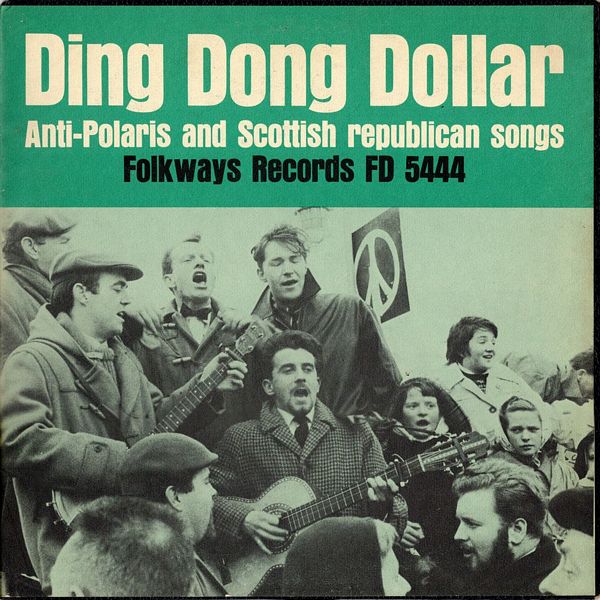 |
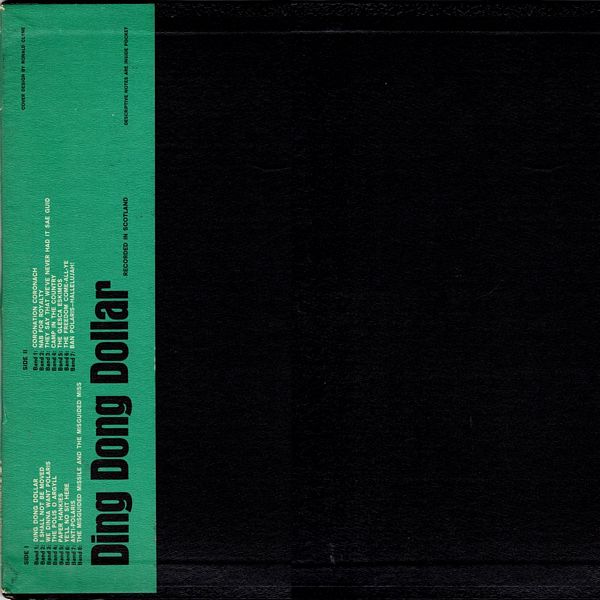
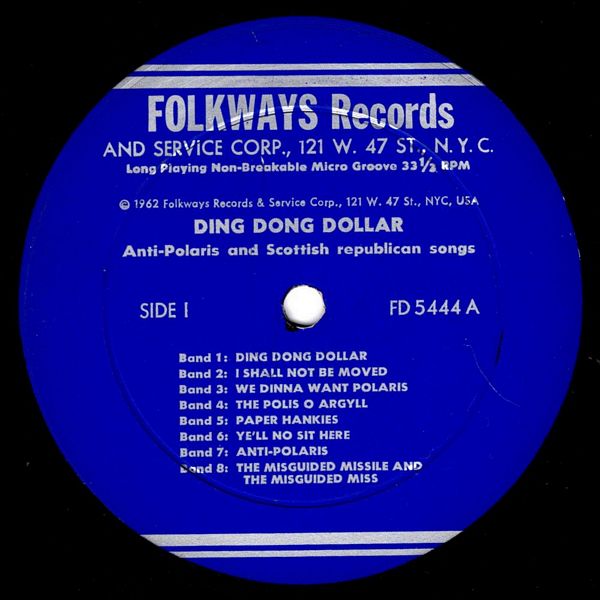
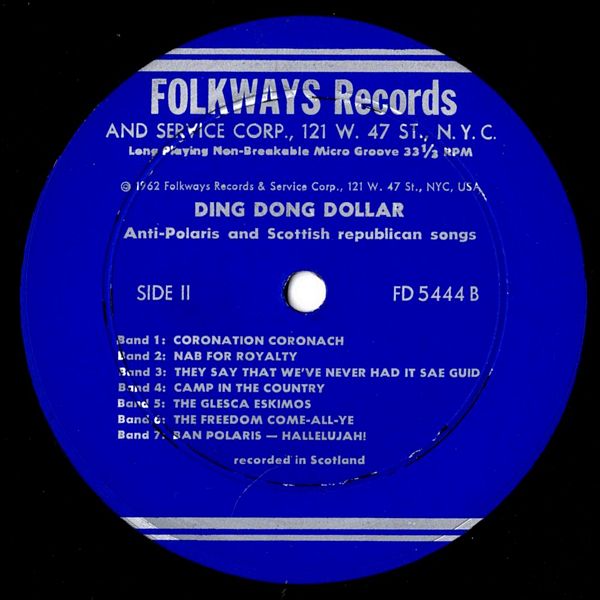 |
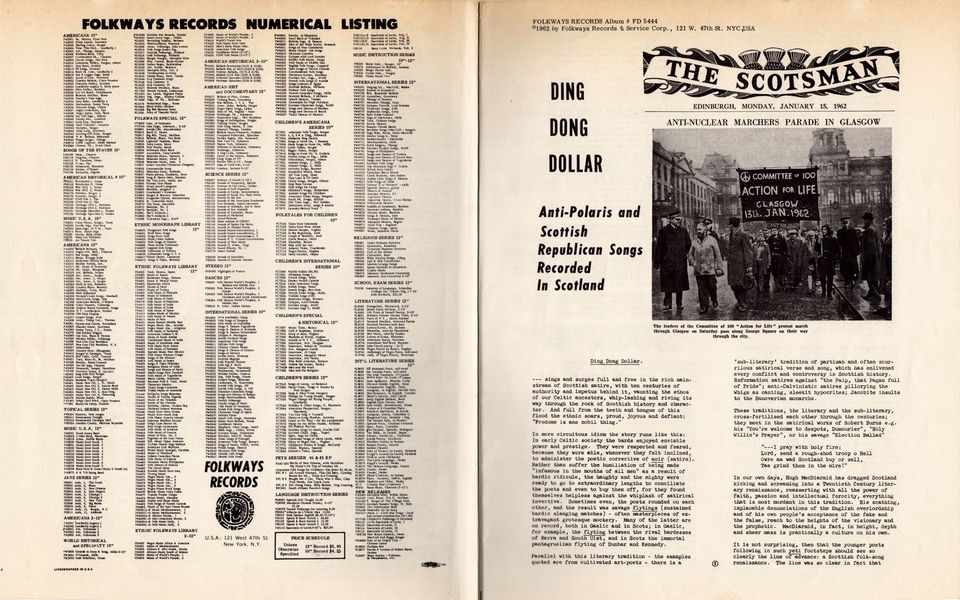
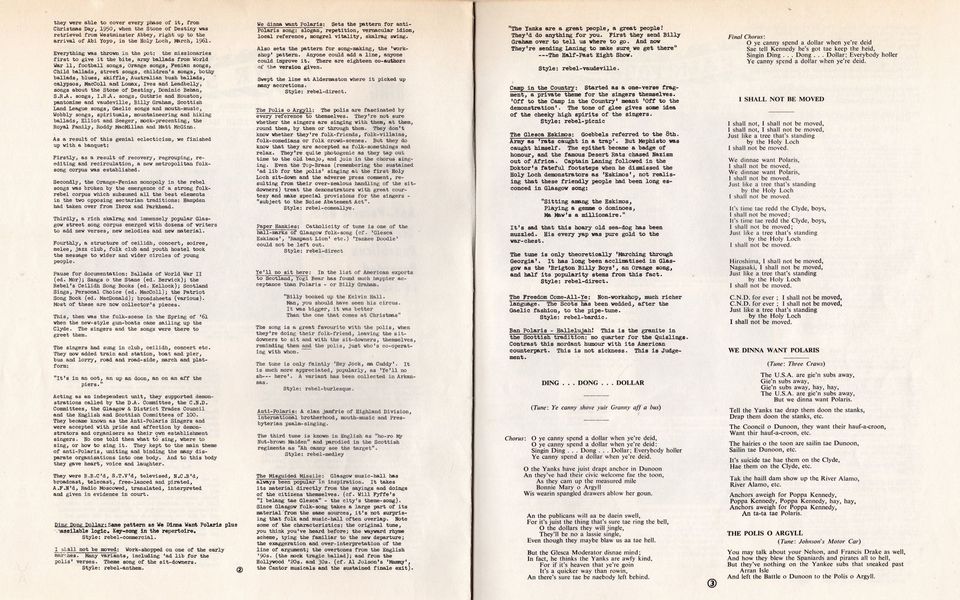 |
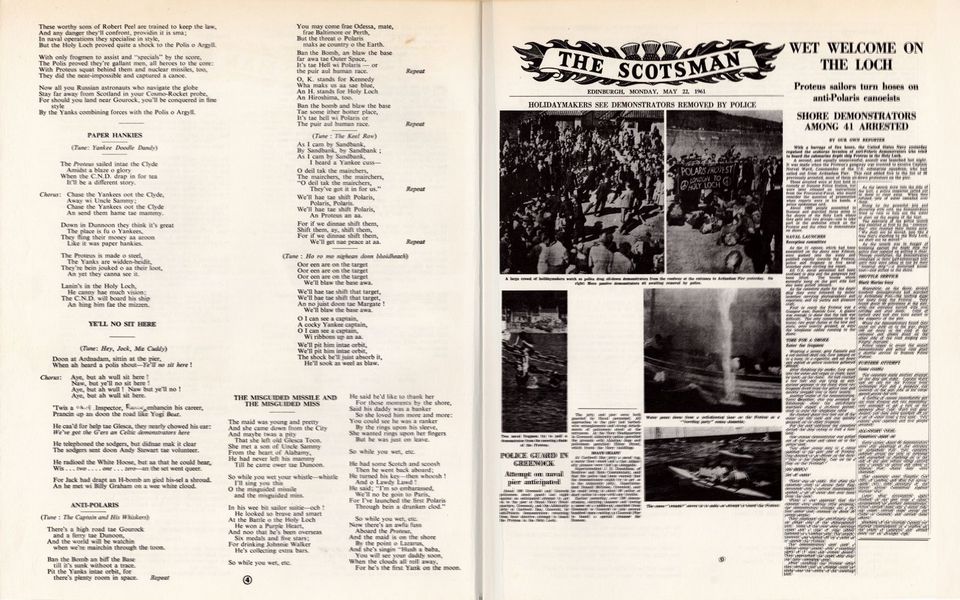
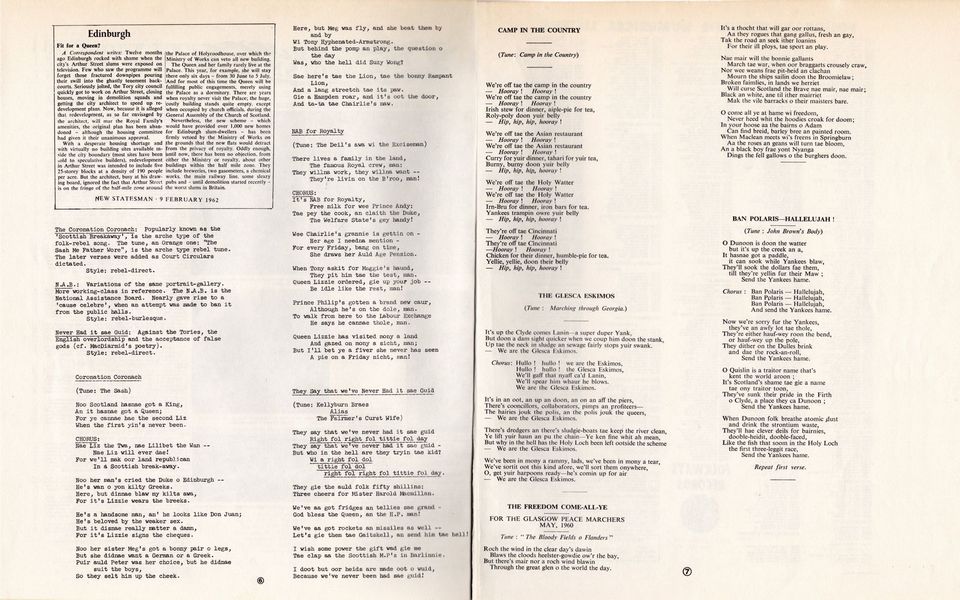 |
Sleeve Notes
Ding Dong Dollar — sings and surges full and free in the rich mainstream of Scottish satire, with ten centuries of authority and impetus behind it, vaunting the ethos of our Celtic ancestors, whip-lashing and riving its way through the rock of Scottish history and character. And full from the teeth and tongue of this flood the ethnic soars, proud, Joyous and defiant: "Fredome is ane nobil thing."
In more circuitous idiom the story runs like this: In early Celtic society the bards enjoyed enviable power and prestige. They were respected and feared, because they were able, whenever they felt inclined, to administer the poetic corrective of aoir (satire).
Rather than suffer the humiliation of being made "infamous in the mouths of all men" as a result of bardic ridicule, the haughty and the mighty were ready to go to extraordinary lengths to conciliate the poets and even to buy them off, for they found themselves helpless against the whiplash of satirical invective
Sometimes even, the poets rounded on each other, and the result was savage flytings (sustained bardic slanging matches) — often masterpieces of extravagant grotesque mockery. Many of the latter are on record, both In Gaelic and in Scots; in Gaelic, for example, the flyting between the rival bardesses of Barra and South Uist, and in Scots the immortal pantagruelian flyting of Dunbar and Kennedy.
Parallel with this literary tradition — the examples quoted are from cultivated art-poets — there is a 'sub-literary' tradition of partisan and often scurrilous satirical verse and song, which has enlivened every conflict and controversy in Scottish history. Reformation satires against "the Paip, that Pagan full of Pride" anti-Calvinistic satires pillorying the Whigs as canting, sleekit hypocrites; Jacobite insults to the Hanoverian monarchs.
These traditions, the literary and the sub-literary, cross-fertilised each other through the centuries; they meet in the satirical works of Robert Burns e.g. his "You're welcome to despots, Dumourier", "Holy Willie's Prayer", or his savage "Election Ballad"
" — I pray with holy fire;
Lord, send a rough-shod troop o Hell
Owre aa wad Scotland buy or sell,
Tae grind them in the mire!"
In our own days, Hugh MacDiarrnid has dragged Scotland kicking and screaming into a Twentieth Century literary renaissance, reasserting with all the power of faith, passion and intellectual ferocity, everything that is most mordant in this tradition. His scathing, implacable denunciations of the English overlordship and of his own people's acceptance of the fake and the false, reach to the heights of the visionary and the prophetic. MacDiarmid, in fact, in height, depth and sheer mass is practically a culture on his own.
It is not surprising, then that the younger poets following in such yeti footsteps should see so clearly the line of advance: a Scottish folk-song renaissance. The line was so clear in fact that they were able to cover every phase of it, from Christmas Day, 1950, when the Stone Of Destiny was retrieved from Westminster Abbey, right up to the arrival of Abi Yoyo, in the Holy Loch, March, 1961.
Everything was thrown In the pot: the missionaries first to give it the bite, army ballads from World War II, football songs, Orange songs, Fenian songs, Child ballads, street songs, children's songs, bothy ballads, blues, skiffle, Australian bush ballads, calypsos, MacColl and Lomax, Ives and Leadbelly, songs about the Stone of Destiny, Dominic Behan, S.R.A. songs, I.R.A. songs, Guthrie and Houston, pantomime and vaudeville, Billy Graham, Scottish Land League songs, Gaelic songs and mouth-music, Wobbly songs, spirituals, mountaineering and hiking ballads, Elliot and Seeger, mock-precenting, the Royal Family, Roddy MacMillan and Matt McGinn.
As a result of this genial eclecticism, we finished up with a banquet: Firstly, as a result of recovery, regrouping, re-editing and recirculation, a new metropolitan folksong corpus was established.
Secondly, the Orange-Fenian monopoly in the rebel songs was broken by the emergence of a strong folk-rebel corpus which subsumed all the best elements in the two opposing sectarian traditions: Hampden had taken over from Ibrox and Parkhead.
Thirdly, a rich skalrag, and immensely popular Glasgow street song corpus emerged with dozens of writers to add new verses, new melodies and new material.
Fourthly, a structure of ceilidh, concert, soiree, melee, jazz club, folk club and youth hostel took the message to wider and wider circles of young people.
Pause for documentation: Ballads of World War II (ed. Mor) Sangs o the Stane (ed. Berwick) the Rebel's Ceilidh Song Books (ed. Kellock) Scotland Sings, Personal Choice (ed. MacColl) the Patriot Song Book (ed. MacDonald) broadsheets (various). Most of these are now collector's pieces.
This, then was the folk-scene in the Spring of '6l when the new-style gun-boats came sailing up the Clyde. The singers and the songs were there to greet them. The singers had sung in club, ceilidh, concert etc.
Acting as an independent unit, they supported demonstrations called by the D.A. Committee, the C.N.D. Committees, the Glasgow & District Trades Council and the English and Scottish Committees of 100. They became known as the Anti-Polaris Singers and were accepted with pride and affection by demonstrators and organisers as their oum establishment singers. No one told them what to sing, where to sing, or how to sing it. They kept to the main theme of anti-Polaris, uniting and binding the many disparate organisations into one body.
And to this body they gave heart, voice and laughter.They were B.B.C'd, S.T.V'd, televised, N.C.B'd, broadcast, telecast, free-lanced and pirated, A.F.N'd, Radio Moscowed, translated, interpreted and given in evidence in court.
They now added train and station, boat and pier, bus and lorry, road and road-side, march and platform: "It's in an oot, an up an doon, an on an aff the piers."
Ding Dong Dollar (Tune: Ye canny above yuir Granny aft a bus) —
Singer: Nigel Denver – w/Jack O'Connor & Josh MacRae
Same pattern as We Dinna Want Polaris plus unassailable logic. Key-song in the repertoire.
Style: rebel-commercial.
I Shall Not be Moved — Singer: Josh MacRae
Work-shopped on one of the early marines. Many variants, including 'ad lib for the polls' verses. Theme song of the sit-downers.
Style: rebel-anthem.
We Dinnae Want Polaris — Singer: Josh MacRae
Sets the pattern for anti-Polaris song: slogan, repetition, vernacular idiom, local reference, mongrel vitality, skalrag swing. Also sets the pattern for song-making, the workshop' pattern. Anyone could add a line, anyone could improve it. There are eighteen co-authors of the version given. Swept the line at Aldermaston where it picked up many accretions.
Style: rebel-direct.
Paper Hankies (Tune: Yankee Doodle Dandy) — Singer: Nigel Denver
Catholicity of tune is one of the hallmarks of Glasgow folk-song (cf. 'Glesca Eskimos', 'Rampant Lion' etc.)
'Yankee Doodle could not be left out.
The Polis of Argyll (Tune: Johnsons Motor Car) — Singer: Josh MacRae
The polis are fascinated by every reference to themselves. They're not sure whether the singers are singing with them, at them, round them, by them or through them. They don't know whether they're folk-friends, folk-villains, folk-comedians or folk crowd-scenes. But they do know that they are accepted as folk-some things and relax. They're quite photogenic as they tap out time to the old banjo, and join in the chorus singing. Even the Top-Brass (remembering the sustained 'ad lib for the polls' singing at the first Holy Loch sit-down and the adverse press comment, resulting from their over-zealous handling of the sit-downers) treat the demonstrators with great courtesy and make special provisions for the singers -"subject to the Noise Abatement Act".
Style: rebel-comeallye.
Ye'll no sit here (Tune: Hey, Jock, Ma Cuddy) —Singers: Morris Blythman & Jack O'Connor
In the list of American exports to Scotland, Yogi Bear has found much happier acceptance than Polaris — or Billy Graham.
"Billy booked up the Kelvin Hall.
Man, you should have seen his circus.
It was bigger, it was better
Than the one that comes at Christmas"
The song is a great favourite with the polis, when they're doing their folk-friend, leaving the sit-downers to sit and with the sit-downers, themselves, reminding them and the polis, just who's co-operating with whom.
The tune is only faintly Hey Jock, na Cuddy'. It is much more appreciated, popularly, as 'Ye'll no sh--- here'. A variant has been collected in Arkansas.
Style: rebel-burlesque.
Anti-Polaris (Tune: The Captain and His Whiskers) — Singer: Josh MacRae
A clan jamfrie of Highland Division, international brotherhood, mouth-music and Presbyterian psalm-singing.
The third tune is known in English as "ho-ro My Nut-brown Maiden" and parodied in the Scottish regiments as "Ah canny see the target".
Style: rebel-medley.
The Misguided Missile and the Misguided Miss — Singer: Nigel Denver
Glasgow music-hall has always been popular in inspiration. It takes its material directly from the sayings and doings of the citizens themselves, (cf. Will Fyffe's "I belang tae Glesca" - the city's theme-song).
Since Glasgow folk-song takes a large part of its material from the same sources, it's not surprising that folk and music-hall often overlap. Note some of the characteristics: the original tune, you think you've heard before; the wayward rhyme scheme, tying the familiar to the new departure; the exaggeration and over-interpretation of the line of argument; the overtones from the English '90s. (the mock tragic ballad) and from the Hollywood '20s. and '30s. (cf. Al Jolsons Manmy, the Cantor musicals and the sustained finale exit).
"The Yanks are a great people, a great people. They'd do anything for you. First they send Billy Graham over to tell us where to go. And now they're sending Laning to make sure we get there"- The Half-Past Eight Show.
Style: rebel-vaudeville.
Coronation Coronach (Tune: The Sash) — Singer: Josh MacRae with Morris shouting the intro!
Popularly known as the 'Scottish Breakaway', is the arche type of the folk-rebel song. The tune, an Orange one: "The Sash Me Father Wore", is the arche type rebel tune. The later verses were added as Court Circulars dictated.
Style: rebel-direct.
NAB for Royalty (Tune: The Deil's awa wi the Exciseman) — Singer: Josh MacRae
Variations of the same portrait-gallery. More working-class in reference. The N.A.B. is the National Assistance Board. Nearly gave rise to a 'cause celebre', when an attempt was made to ban it from the public halls.
Style: rebel-burlesque.
They say we've never Had it sae Guid (Tune: Kellyburn Braes — Alias — The Fairmers Curst Wife) — Singer: Josh MacRae
Against the Tories, the English overlordship and the acceptance of false gods (cf. MacDiarmid's poetry).
Style: rebel-direct.
Camp in the Country (Tune: Camp in the Country) — Singer: Nigel Denver
Started as a one-verse fragment, a private theme for the singers themselves. Off to the Camp In the Country' meant Off to the demonstration'. The tone of glee gives some idea of the cheeky high spirits of the singers.
Style: rebel-picnic
The Glesga Eskimos (Tune: Marching through Georgia) — Singer: Josh MacRae
Goebbels referred to the 8th Army as 'rats caught in a trap. But Mephisto was caught himself. The epithet became a badge of honour, and the famous Desert Rats chased Nazism out of Africa. Captain Laning followed in the Doktor's fateful footsteps when he dismissed the Holy Loch demonstrators as 'Eskimos', not realising that these friendly people had been long esconced in Glasgow song.
The Freedom Come all ye (Tune: The Bloody Fields o Flanders) — Singer: Jack O'Connor
Non-workshop, much richer language. The Scots has been wedded, after the Gaelic fashion, to the pipe-tune.
Style: rebel-bardic.
For the Glasgow peace marchers May, 1960
Ban Polaris, Hallelujah (Tune: Tune: John Browns Body) — Singer: Josh MacRae
This is the granite in the Scottish tradition: no quarter for the Quislings. Contrast this mordant humour with its American counterpart. This is not sickness. This is Judgement.